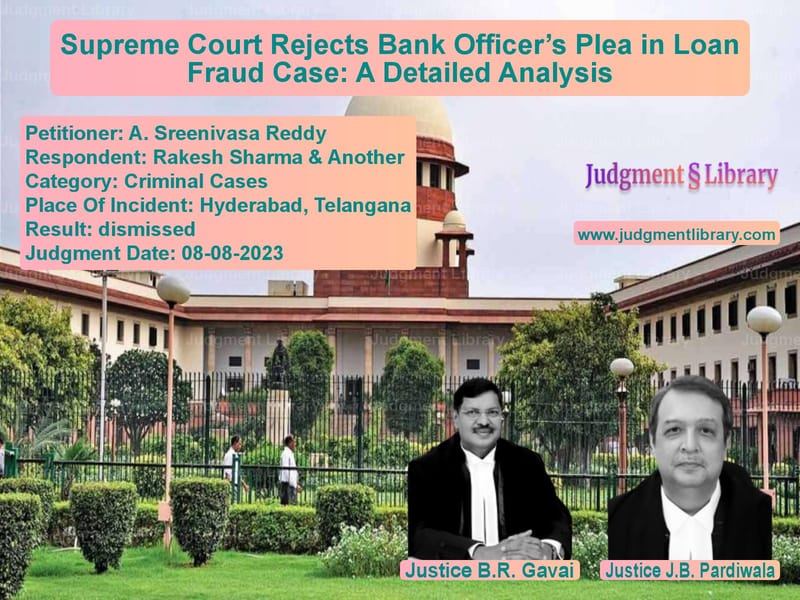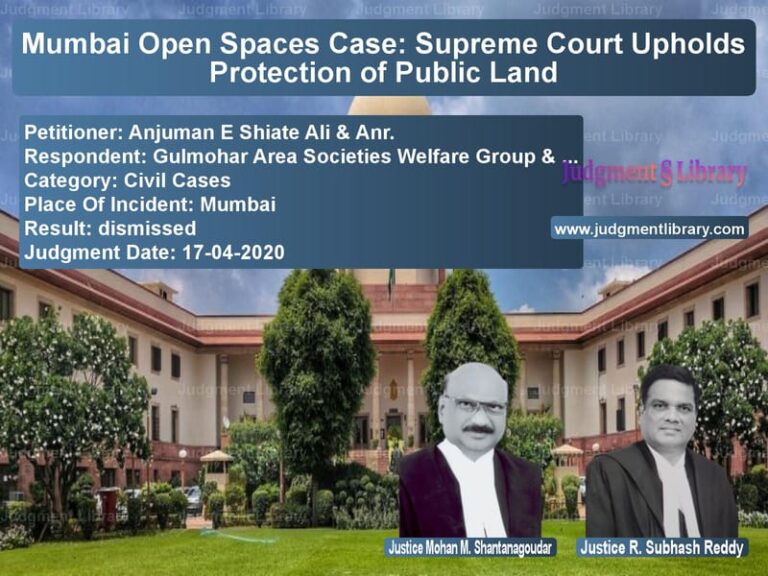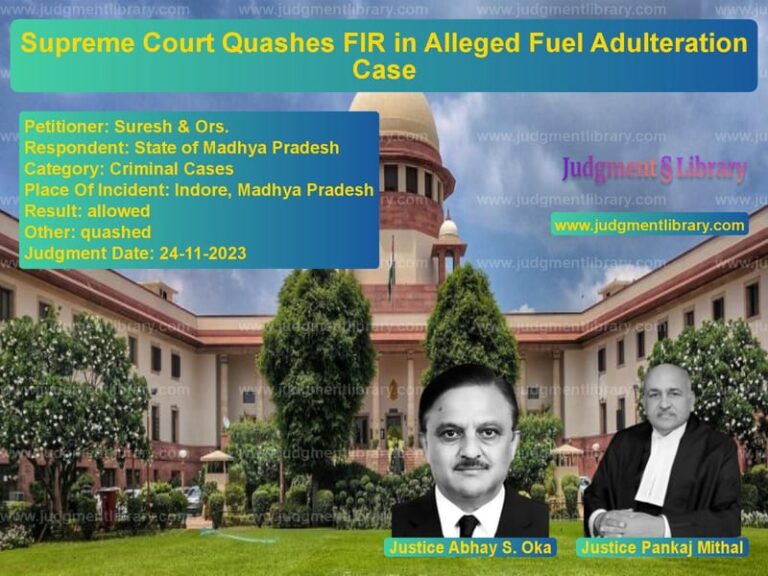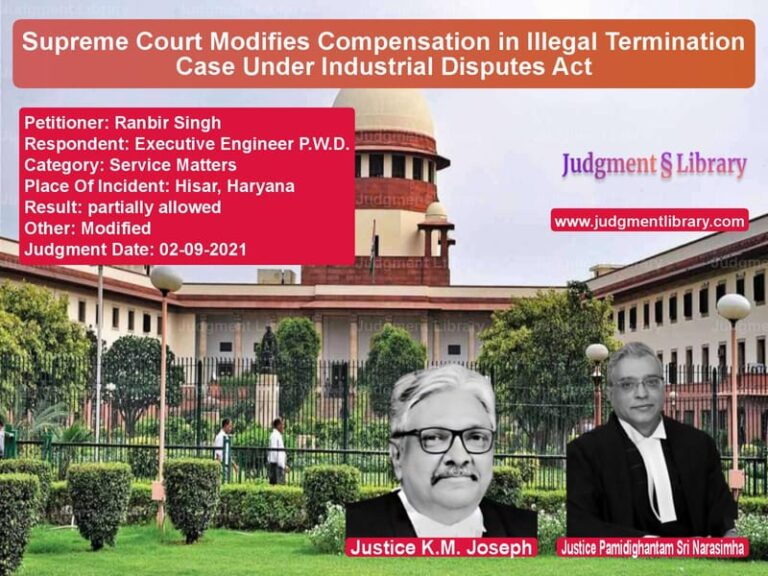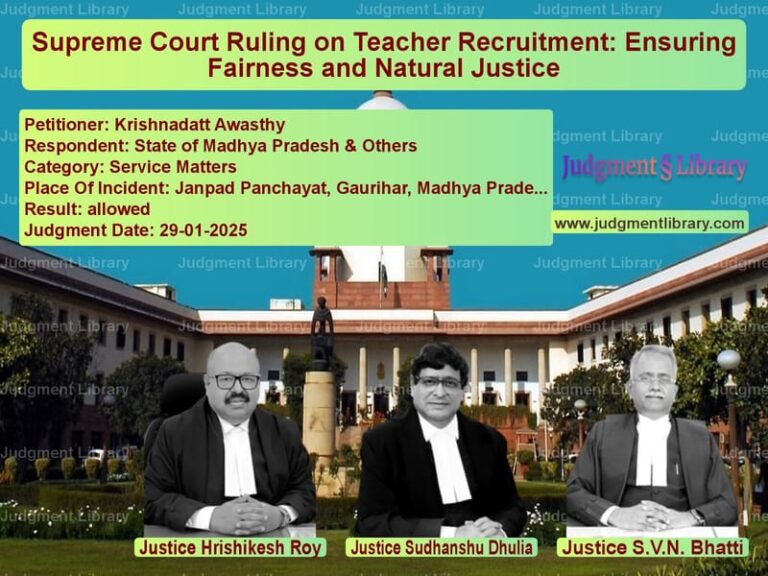Supreme Court Rejects Bank Officer’s Plea in Loan Fraud Case: A Detailed Analysis
The Supreme Court recently delivered a significant judgment in the case of A. Sreenivasa Reddy vs. Rakesh Sharma & Another, which deals with allegations of financial misconduct and fraud in a public sector bank. The judgment is critical in defining the role of bank officers in fraudulent loan approvals and the applicability of criminal proceedings against them under the Indian Penal Code (IPC) and the Prevention of Corruption Act, 1988 (PC Act). The apex court dismissed the appellant’s plea to quash criminal charges, stating that public servants in nationalized banks do not require sanction under Section 197 of the Code of Criminal Procedure (CrPC) for prosecution.
Background of the Case
The case originated from an alleged fraud in which the appellant, A. Sreenivasa Reddy, then serving as an Assistant General Manager at the State Bank of India (SBI), Hyderabad, was accused of sanctioning an unauthorized loan to M/s Sven Genetech Limited, Secunderabad. The prosecution alleged that the accused conspired with other bank officials and company representatives to approve and disburse loans worth Rs. 22.50 crore, misusing the banking system and causing a wrongful loss to the bank.
Key Developments in the Case
- The company, M/s Sven Genetech Limited, applied for loans to finance its expansion and acquire machinery.
- In addition to the corporate loan, the company sought credit limits of Rs. 5 crore for procuring raw materials and Rs. 20 crore for working capital.
- The CBI alleged that the funds were diverted for repaying old debts and personal use instead of the intended purposes.
- An FIR was registered by the Central Bureau of Investigation (CBI) under Sections 120-B (criminal conspiracy), 420 (cheating), 468 (forgery for the purpose of cheating), and 471 (using a forged document as genuine) of the IPC, along with provisions of the PC Act.
Arguments by the Petitioner (A. Sreenivasa Reddy)
The appellant sought to quash the criminal proceedings, raising the following key arguments:
- Sanction Under Section 19 of the PC Act: Since the sanction for prosecution under the PC Act was refused, the prosecution under the IPC should also not proceed.
- Requirement of Sanction Under Section 197 of the CrPC: As a bank officer, the appellant claimed protection under Section 197, arguing that he could not be prosecuted without prior sanction.
- Exoneration in Departmental Inquiry: The appellant pointed out that he was cleared of similar allegations in an internal bank inquiry, which should weigh in favor of quashing the criminal case.
Arguments by the Respondents (CBI and SBI)
The respondents countered these arguments with the following points:
- Sanction Not Required for IPC Offenses: The refusal of sanction under the PC Act does not bar prosecution under general criminal law if the facts independently establish an offense.
- Section 197 CrPC Not Applicable: The CBI argued that bank officers in nationalized banks are not government servants removable only with government sanction, making Section 197 inapplicable.
- Departmental Inquiry Irrelevant: The respondents maintained that exoneration in a departmental inquiry does not affect criminal liability, as the standards of proof in disciplinary proceedings differ from criminal trials.
Key Observations by the Supreme Court
The Supreme Court examined two primary legal issues:
1. The Impact of Sanction Denial Under the PC Act
“The absence of sanction under the PC Act does not bar prosecution under the IPC if the alleged acts constitute independent offenses under general criminal law.”
The Court clarified that an accused could still face prosecution under IPC sections, even if sanction under the PC Act was denied, provided the charges were distinct and established under criminal law.
2. Applicability of Section 197 of the CrPC to Bank Officers
“Section 197 applies only to public servants who are not removable from office without government sanction. Bank officials do not fall under this category.”
The Court ruled that officers in nationalized banks are not government servants for the purposes of Section 197. The ruling reaffirmed previous judgments such as:
- K. Ch. Prasad v. J. Vanalatha Devi: Held that nationalized bank officers do not need prior sanction for prosecution under Section 197.
- S.K. Miglani v. State (NCT of Delhi): Stated that sanction under Section 197 is not required for bank officers accused of offenses under IPC.
Legal Precedents Considered
The Court cited multiple precedents supporting the principle that lack of sanction under the PC Act does not impede prosecution under the IPC:
- Kalicharan Mahapatra v. State of Orissa: Held that offenses under the PC Act and IPC are distinct, and prosecution under IPC can proceed independently.
- Lalu Prasad Yadav v. State of Bihar: Clarified that Section 19 of the PC Act and Section 197 of the CrPC operate in different fields.
- Parkash Singh Badal v. State of Punjab: Reaffirmed that prior sanction requirements depend on the nature of the offense and the position of the accused.
Final Judgment
Based on these findings, the Supreme Court ruled:
“The appellant has not made out a case for interference. The criminal prosecution shall proceed in accordance with law.”
The judgment effectively dismissed the appellant’s plea, allowing the criminal trial to proceed.
Conclusion
The Supreme Court’s decision in A. Sreenivasa Reddy vs. Rakesh Sharma & Another sets an important precedent for financial fraud cases involving public sector bank officials. The judgment underscores the principle that:
- Denial of sanction under the PC Act does not automatically preclude prosecution under IPC.
- Officers of nationalized banks do not fall under Section 197 of the CrPC for sanction requirements.
- Departmental inquiries have no bearing on independent criminal proceedings.
This ruling will likely impact future banking fraud cases, ensuring that officials involved in financial misconduct can be held accountable under general criminal law without procedural roadblocks.
Petitioner Name: A. Sreenivasa Reddy.Respondent Name: Rakesh Sharma & Another.Judgment By: Justice B.R. Gavai, Justice J.B. Pardiwala.Place Of Incident: Hyderabad, Telangana.Judgment Date: 08-08-2023.
Don’t miss out on the full details! Download the complete judgment in PDF format below and gain valuable insights instantly!
Download Judgment: a.-sreenivasa-reddy-vs-rakesh-sharma-&-anot-supreme-court-of-india-judgment-dated-08-08-2023.pdf
Directly Download Judgment: Directly download this Judgment
See all petitions in Fraud and Forgery
See all petitions in Money Laundering Cases
See all petitions in Judgment by B R Gavai
See all petitions in Judgment by J.B. Pardiwala
See all petitions in dismissed
See all petitions in supreme court of India judgments August 2023
See all petitions in 2023 judgments
See all posts in Criminal Cases Category
See all allowed petitions in Criminal Cases Category
See all Dismissed petitions in Criminal Cases Category
See all partially allowed petitions in Criminal Cases Category

